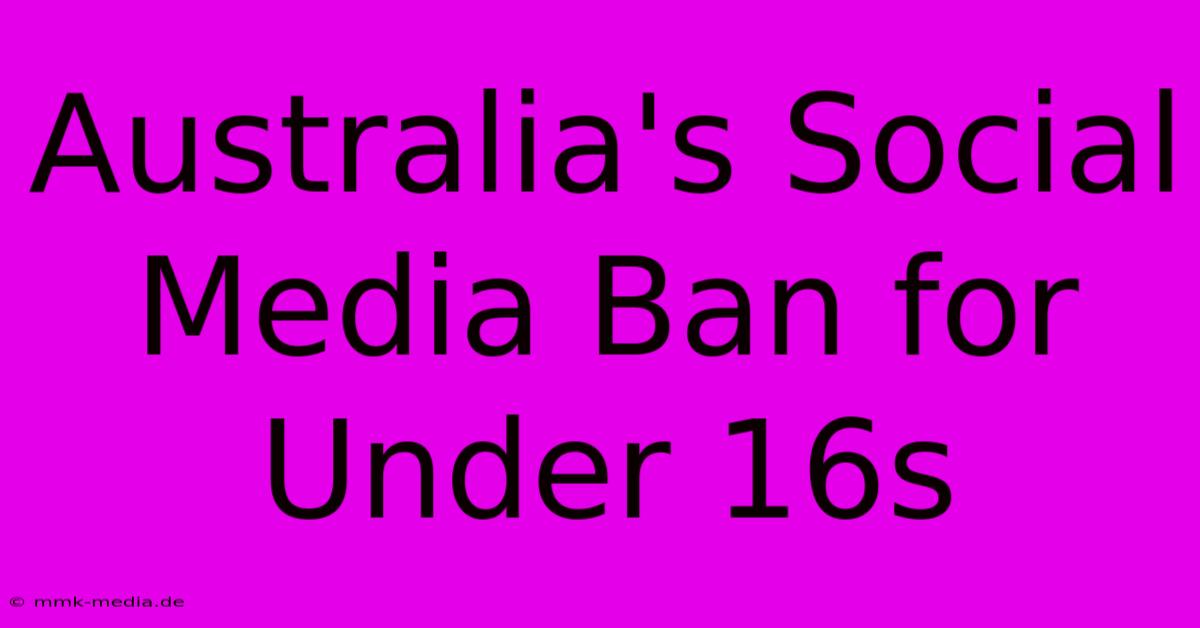Australia's Social Media Ban For Under 16s

Discover more in-depth information on our site. Click the link below to dive deeper: Visit the Best Website meltwatermedia.ca. Make sure you don’t miss it!
Table of Contents
Australia's Social Media Ban for Under 16s: A Necessary Step or Overreach?
Australia is grappling with a complex issue: the safety and well-being of children online. Recent proposals and discussions surrounding a potential social media ban for under-16s have ignited a fierce debate, pitting parental rights against children's autonomy and the potential for censorship. This article delves into the arguments for and against such a ban, examining its potential impact on children, parents, and society.
The Case for a Ban: Protecting Vulnerable Young Minds
Proponents of a social media ban for under-16s argue that it's a necessary measure to protect children from the myriad of risks associated with online platforms. These risks include:
Cyberbullying and Online Harassment:
The anonymity and reach of social media make it a breeding ground for cyberbullying. For young people, whose identities are still developing, the impact of online harassment can be devastating, leading to anxiety, depression, and even suicidal thoughts. A ban, proponents argue, would significantly reduce their exposure to this harmful behavior.
Exposure to Inappropriate Content:
Children under 16 are particularly vulnerable to exposure to inappropriate content, including violence, pornography, and hate speech. While age verification systems exist, they are often easily bypassed, leaving young users exposed to harmful material that can have long-term psychological consequences.
Addiction and Mental Health Concerns:
Social media platforms are designed to be addictive, employing techniques to maximize user engagement. For developing brains, this constant stimulation can lead to addiction, impacting sleep, school performance, and overall mental health. A ban, some argue, could help mitigate these risks.
Privacy Concerns:
Children under 16 often lack the maturity to understand and manage their online privacy. Social media platforms collect vast amounts of personal data, which can be misused or exploited. A ban would protect children from these privacy violations.
The Counterarguments: Freedom of Expression and Parental Responsibility
Opponents of a ban raise several counterarguments, questioning its feasibility and effectiveness.
Infringement on Freedom of Expression:
A blanket ban on social media for under-16s could be seen as an infringement on their freedom of expression and access to information. Children use social media to connect with friends and family, participate in online communities, and access educational resources. Restricting this access could have detrimental effects.
Enforcement Challenges:
Enforcing a social media ban for under-16s would be incredibly challenging. Children could easily circumvent the ban by using their parents' accounts or accessing platforms through VPNs. Effective enforcement would require significant resources and may prove impractical.
Parental Responsibility:
Critics argue that the primary responsibility for protecting children online lies with parents, not the government. Parents should be empowered to monitor their children's online activity and educate them about online safety. A ban, they argue, shifts this responsibility to the state, potentially hindering parental involvement.
Digital Divide:
A ban could exacerbate the existing digital divide, disproportionately affecting children from low-income families who may rely on social media for access to information and educational resources.
Finding a Balance: A More Nuanced Approach
Rather than a complete ban, a more nuanced approach might be more effective. This could involve:
- Strengthening age verification systems: Improving the accuracy and effectiveness of age verification mechanisms on social media platforms.
- Increased parental controls: Providing parents with more robust tools to monitor and control their children's online activity.
- Comprehensive online safety education: Educating children and parents about the risks and benefits of social media and promoting responsible online behavior.
- Collaboration between platforms, government, and schools: Working together to develop effective strategies for protecting children online.
The debate surrounding a social media ban for under-16s in Australia highlights the complex challenges of balancing children's safety with their rights and freedoms in the digital age. A comprehensive and balanced approach, focusing on education, parental involvement, and improved platform regulation, may be more effective than a blanket ban. The conversation is far from over, and finding a solution that protects children without stifling their development remains a key challenge.

Thank you for taking the time to explore our website Australia's Social Media Ban For Under 16s. We hope you find the information useful. Feel free to contact us for any questions, and don’t forget to bookmark us for future visits!
We truly appreciate your visit to explore more about Australia's Social Media Ban For Under 16s. Let us know if you need further assistance. Be sure to bookmark this site and visit us again soon!
Featured Posts
-
27 B Fraud Vietnamese Tycoon Seeks Clemency
Nov 28, 2024
-
Business Tycoon Ananda Krishnan Aged 86
Nov 28, 2024
-
Liverpool Pull Away Man Citys Title Hopes Fade
Nov 28, 2024
-
2024 Macys Thanksgiving Day Parade
Nov 28, 2024
-
Death Of Billionaire Ananda Krishnan Announced
Nov 28, 2024
